
The music of China consists of many distinct traditions,often specifically originating with one of the country's various ethnic groups. It is produced within and without the country,involving either people of Chinese origin,the use of traditional Chinese instruments,Chinese music theory,or the languages of China. It includes traditional classical forms and indigenous folk music,as well as recorded popular music and forms inspired by Western culture.
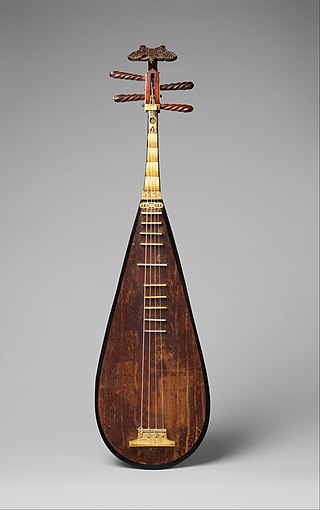
The pipa,pípá,or p'i-p'a is a traditional Chinese musical instrument belonging to the plucked category of instruments. Sometimes called the "Chinese lute",the instrument has a pear-shaped wooden body with a varying number of frets ranging from 12 to 31. Another Chinese four-string plucked lute is the liuqin,which looks like a smaller version of the pipa. The pear-shaped instrument may have existed in China as early as the Han dynasty,and although historically the term pipa was once used to refer to a variety of plucked chordophones,its usage since the Song dynasty refers exclusively to the pear-shaped instrument.

The erhu is a Chinese two-stringed bowed musical instrument,more specifically a spike fiddle,which may also be called a Southern Fiddle,and is sometimes known in the Western world as the Chinese violin or a Chinese two-stringed fiddle.

Chinese musicology is the academic study of traditional Chinese music. This discipline has a very long history. Traditional Chinese music can be traced back to around 8,000 years ago during the Neolithic age. The concept of music,called 乐,stands among the oldest categories of Chinese thought;however,in the known sources,it does not receive a fairly clear definition until the writing of the Classic of Music. Chinese music has always been interacting with different cultures throughout its long history,dating all the way back to the Xia and Shang dynasties.
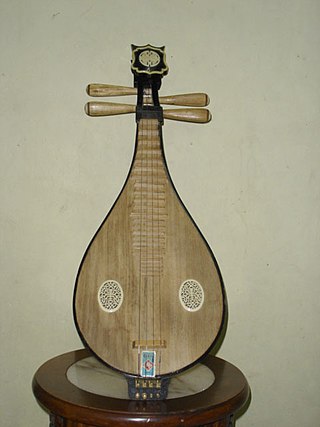
The liuqin is a three,four or five -stringed Chinese mandolin with a pear-shaped body. The range of its voice is much higher than the pipa,and it has its own special place in Chinese music,whether in orchestral music or in solo pieces. This has been the result of a modernization in its usage in recent years,leading to a gradual elevation in status of the liuqin from an accompaniment instrument in folk Chinese opera,to an instrument well-appreciated for its unique tonal and acoustic qualities. The position of the instrument is lower than the pipa,being held diagonally like the Chinese ruan and yueqin. Like the ruan and unlike the pipa its strings are elevated by a bridge and the soundboard has two prominent soundholes. Finally,the instrument is played with a pick with similar technique to both ruan and yueqin,whereas the pipa is played with the fingers. Therefore,the liuqin is most commonly played and doubled by those with ruan and yueqin experience.
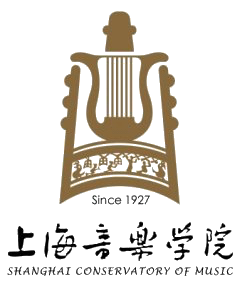
The Shanghai Conservatory of Music is a municipal public college in Shanghai,China. It is affiliated with the City of Shanghai. The university is part of the Double First-Class Construction.
12 Girls Band are an all female Chinese musical group that initially consisted of twelve members before the addition of a thirteenth. Twelve Girls Band use traditional Chinese instruments to play both traditional Chinese and Western music. Formed on June 18,2001,the women were selected by audition from more than 4,000 contestants. Each woman is classically-trained,and the band members come from various conservatories in the People's Republic of China (PRC),including the China Academy of Music,the Chinese National Orchestra,and the Central Conservatory of Music.

The term Chinese orchestra is most commonly used to refer to the modern Chinese orchestra that is found in China and various overseas Chinese communities. This modern Chinese orchestra first developed out of Jiangnan sizhu ensemble in the 1920s into a form that is based on the structure and principles of a Western symphony orchestra but using Chinese instruments. The orchestra is divided into four sections –wind,plucked strings,bowed strings,and percussion,and usually performs modernized traditional music called guoyue. The orchestra may be referred to as Minzu Yuetuan or Minyuetuan in mainland China,Chung Ngok Tuen in Hong Kong,Huayuetuan in Southeast Asia,or Guoyuetuan in Taiwan.

The ruan is a traditional Chinese plucked string instrument. It is a lute with a fretted neck,a circular body,and four strings. Its four strings were formerly made of silk but since the 20th century they have been made of steel. The modern ruan has 24 frets with 12 semitones on each string,which has greatly expanded its range from a previous 13 frets. The frets are commonly made of ivory or in recent times of metal mounted on wood. The metal frets produce a brighter tone as compared to the ivory frets. It is sometimes called ruanqin,particularly in Taiwan.
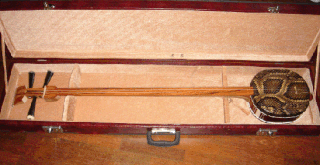
The sanxian is a three-stringed traditional Chinese lute. It has a long fretless fingerboard,and the body is traditionally made from snake skin stretched over a rounded rectangular resonator. It is made in several sizes for different purposes and in the early 20th century a four-stringed version,the jiaxian sanxian (加弦三弦),was developed. The northern sanxian is generally larger,at about 122 cm (48 in) in length,while southern versions of the instrument are usually about 95 cm (37 in) in length.
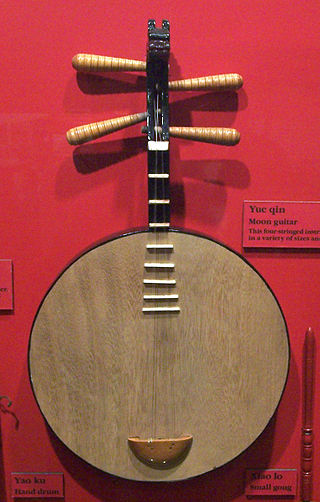
The yueqin,also called a moon lute or moon guitar,is a traditional Chinese string instrument. It is a lute with a round,hollow soundboard,a short fretted neck,and usually four strings. It is an important instrument in the Peking opera orchestra,often taking the role of main melodic instrument in lieu of the bowed string section.
Chen Yi is a Chinese-American composer of contemporary classical music and violinist. She was the first Chinese woman to receive a Master of Arts (M.A.) in music composition from the Central Conservatory of Music in Beijing. Chen was a finalist for the 2006 Pulitzer Prize for Music for her composition Si Ji,and has received awards from the Koussevistky Music Foundation and American Academy of Arts and Letters,as well as fellowships from the Guggenheim Foundation and the National Endowment for the Arts. In 2010,she was awarded an Honorary Doctorate from The New School and in 2012,she was awarded the Brock Commission from the American Choral Directors Association. She was elected to the American Academy of Arts and Letters in 2019.
Gao Hong is a composer and performer of the Chinese pipa. She serves as the professor of Chinese Musical Instruments at Carleton College. She is the recipient of multiple music awards and has been honored by the Saint Paul,Minnesota Mayor Melvin Carter (politician),who declared April 3,2022 to be Gao Hong Day.
The Shanghai Quartet is a string quartet that formed in 1983. The quartet is made up of:first violinist Weigang Li,second violinist Angelo Xiang Yu,violist Honggang Li,and cellist Nicholas Tzavaras. On November 20,2020 the ensemble announced the newest member,Angelo Xiang Yu. The Shanghai Quartet accepted the resignation of former second violinist Yi-Wen Jiang on March 17,2020. The group's tours have included North America,South America,Japan,China,Australia,New Zealand,and Europe. Among their performances,the Shanghai Quartet has developed a long list of performance collaborators including Yo-Yo Ma,David Soyer,Eugenia Zukerman,Sharon Isbin,Ruth Laredo,Arnold Steinhardt,and Chanticleer.
The London Youlan Qin Society is a London-based qin society serving guqin players in the UK. Of the three major qin societies of the West,this society was the most informal but still the most active in terms of regular events and yajis.

Zhou Yi is a Chinese pipa player.

Wang Xilin is a Chinese composer.
Qigang Chen is a Chinese-French composer who has lived in France since 1984 and obtained French citizenship in 1992.

The Forbidden City Chamber Orchestra is a chamber orchestra based in Beijing,China,which is composed of eleven classically trained musicians,who interpret elements of Chinese folk music. The intention of the group is to express the changes taking place in contemporary Chinese culture,through the sounds of ancient instruments. It has participated in important national and international music events held in Brisbane,Canberra,Wellington,Christchurch.

Yang Jing is a Chinese born,Swiss composer and world-famous concert pipa soloist.












